Understanding the Impact of Drugs on Cardiac Health
The human heart is a vital organ whose health can be significantly influenced by various substances. While many are aware of the immediate effects of drugs, fewer recognize their potential to cause long-term structural changes like an enlarged heart, or cardiomegaly. This article explores how different drugs influence heart size, their mechanisms, associated symptoms, and the importance of awareness for preventing severe cardiac complications.
How Drugs Affect Heart Structure and Function
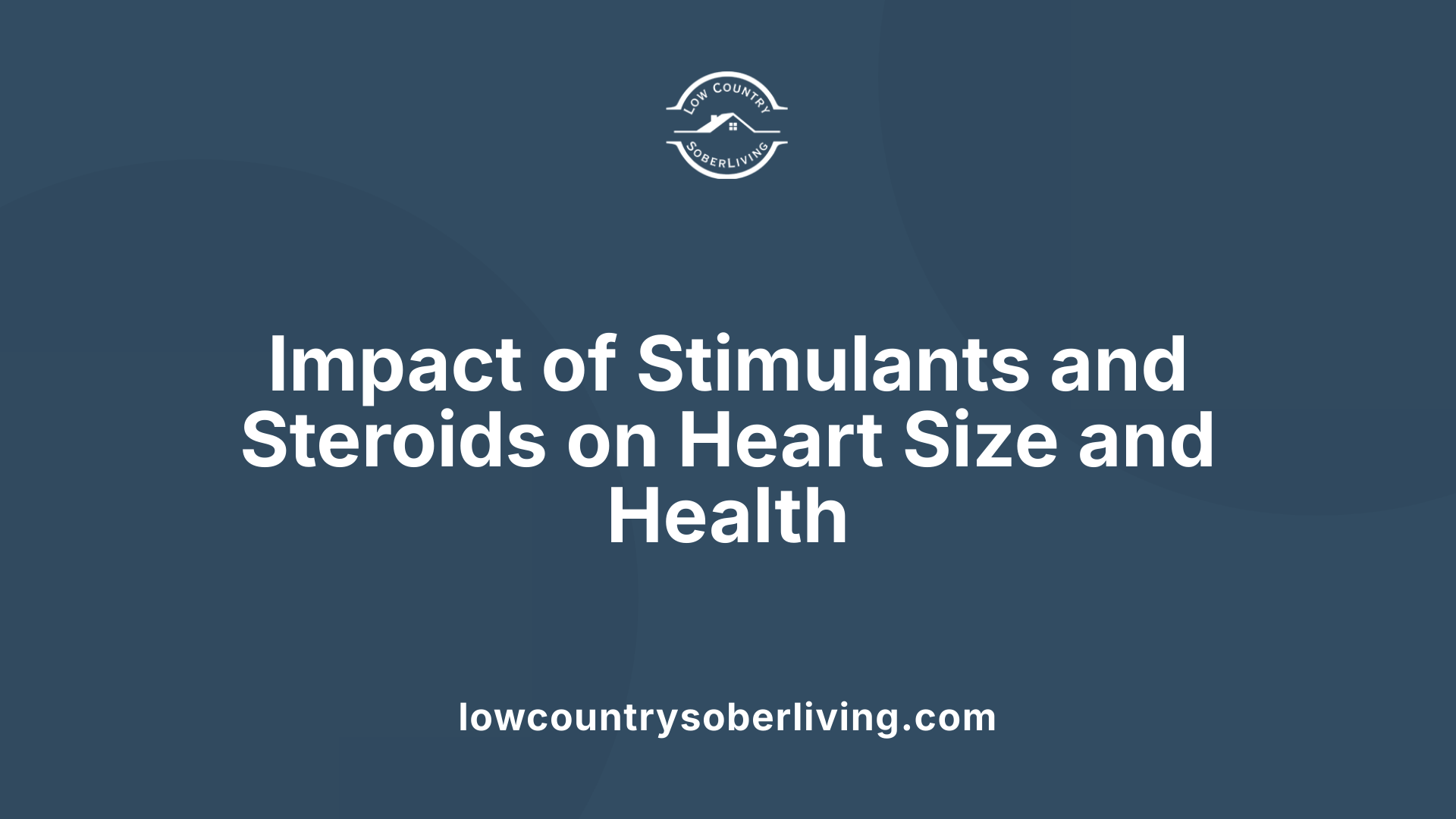 Many substances, especially stimulant drugs like cocaine, amphetamines, and methamphetamine, directly impact the heart's shape and activity. They can cause the heart muscles to enlarge, a condition known as cardiomegaly, which can weaken heart function over time.
Many substances, especially stimulant drugs like cocaine, amphetamines, and methamphetamine, directly impact the heart's shape and activity. They can cause the heart muscles to enlarge, a condition known as cardiomegaly, which can weaken heart function over time.
One way drugs induce heart enlargement is through increased workload. Stimulants activate the sympathetic nervous system, leading to higher heart rates and elevated blood pressure. This increased stress causes the heart to work harder, resulting in thickened heart walls and larger overall size.
Cocaine, specifically, is linked to several harmful effects: it raises blood pressure, stiffens arteries, damages cardiac tissue, and can cause infections like infective endocarditis when injected. These damages contribute to the heart's abnormal growth and malfunction.
In addition to stimulants, anabolic steroids promote abnormal muscle growth by disrupting hormonal balance, causing the heart muscle, particularly the ventricles, to thicken—a condition called ventricular hypertrophy. While this may initially improve strength, it increases the risk of irregular heartbeats and sudden death.
Excessive alcohol intake can lead to alcoholic cardiomyopathy, weakening the heart muscle as it enlarges, which impairs its ability to pump blood effectively. This form of heart enlargement often results from inflammation, fibrosis, and muscle damage.
Other drugs, including opioids and recreational substances such as ecstasy and marijuana, also influence heart size and function through various pathways. For instance, opioids can cause infective endocarditis, affecting cardiac structure, while ecstasy and marijuana stimulate the central nervous system, increasing heart rate and blood pressure.
The biological mechanisms behind drug-induced heart enlargement include increased oxygen demand, vascular constriction, damage to the delicate lining of blood vessels, and acceleration of atherosclerosis—plaque buildup within arteries. These effects strain the heart further and can lead to failure.
Distinguishing drug-induced cardiomegaly from other causes like hypertension is essential. While high blood pressure remains the most common cause of an enlarged heart due to sustained pressure overload, drugs can trigger similar changes or exacerbate existing conditions.
| Cause | Effect on Heart | Additional Notes |
|---|---|---|
| Stimulants (e.g., cocaine, amphetamines) | Heart enlargement, increased workload | Activate sympathetic nervous system, raise blood pressure |
| Anabolic steroids | Ventricular hypertrophy | Disrupt hormonal balance, increase muscle mass |
| Excessive alcohol | Alcoholic cardiomyopathy | Weakens muscle, causes fibrosis |
| High blood pressure | Heart enlargement | Sustains pressure overload on heart muscle |
Understanding these effects emphasizes the importance of avoiding substance abuse and managing underlying conditions to prevent serious heart damage.
The Role of Specific Substances in Cardiac Enlargement
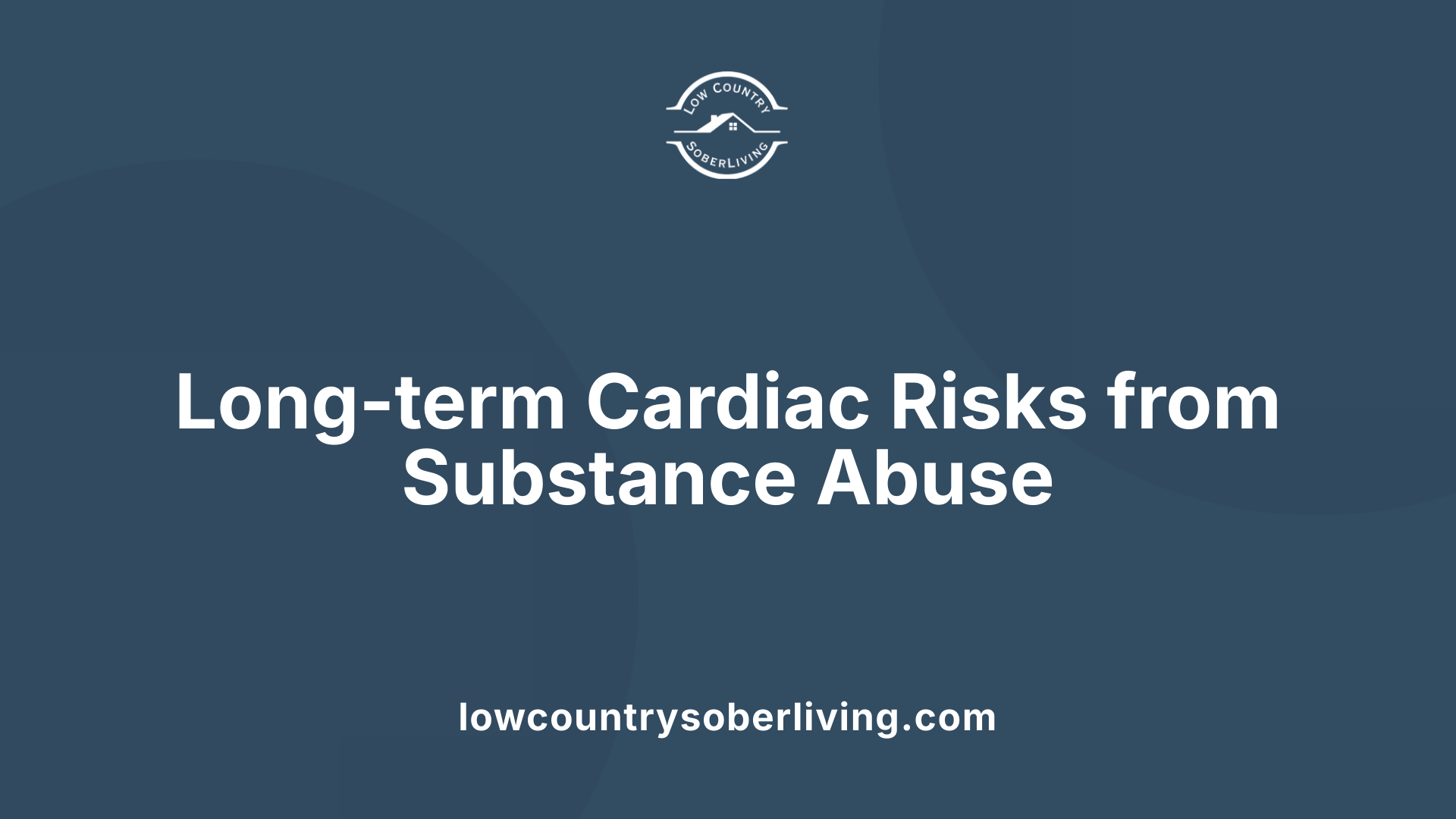
Can drug abuse cause long-term heart problems?
Yes, long-term drug misuse can lead to extensive heart issues. Substances such as alcohol, cocaine, methamphetamine, opioids, and cannabis are all associated with serious cardiovascular risks.
Repeated use of these drugs can cause high blood pressure, clogging and narrowing of arteries, and irregular heart rhythms. Over time, these effects may damage the heart's structure and function, increasing the risk of heart attacks, strokes, and chronic heart failure.
Chronic abuse often results in permanent changes like myocardial damage and enlargement of the heart muscle, a condition called cardiomegaly. These changes elevate the chance of life-threatening complications. Epidemiological studies report higher hospitalization rates for heart failure and other cardiac problems among chronic drug users.
Therefore, sustained drug abuse significantly contributes to the development of long-term cardiac health problems.
Clinical Manifestations and Risks of Drug-Induced Cardiac Enlargement
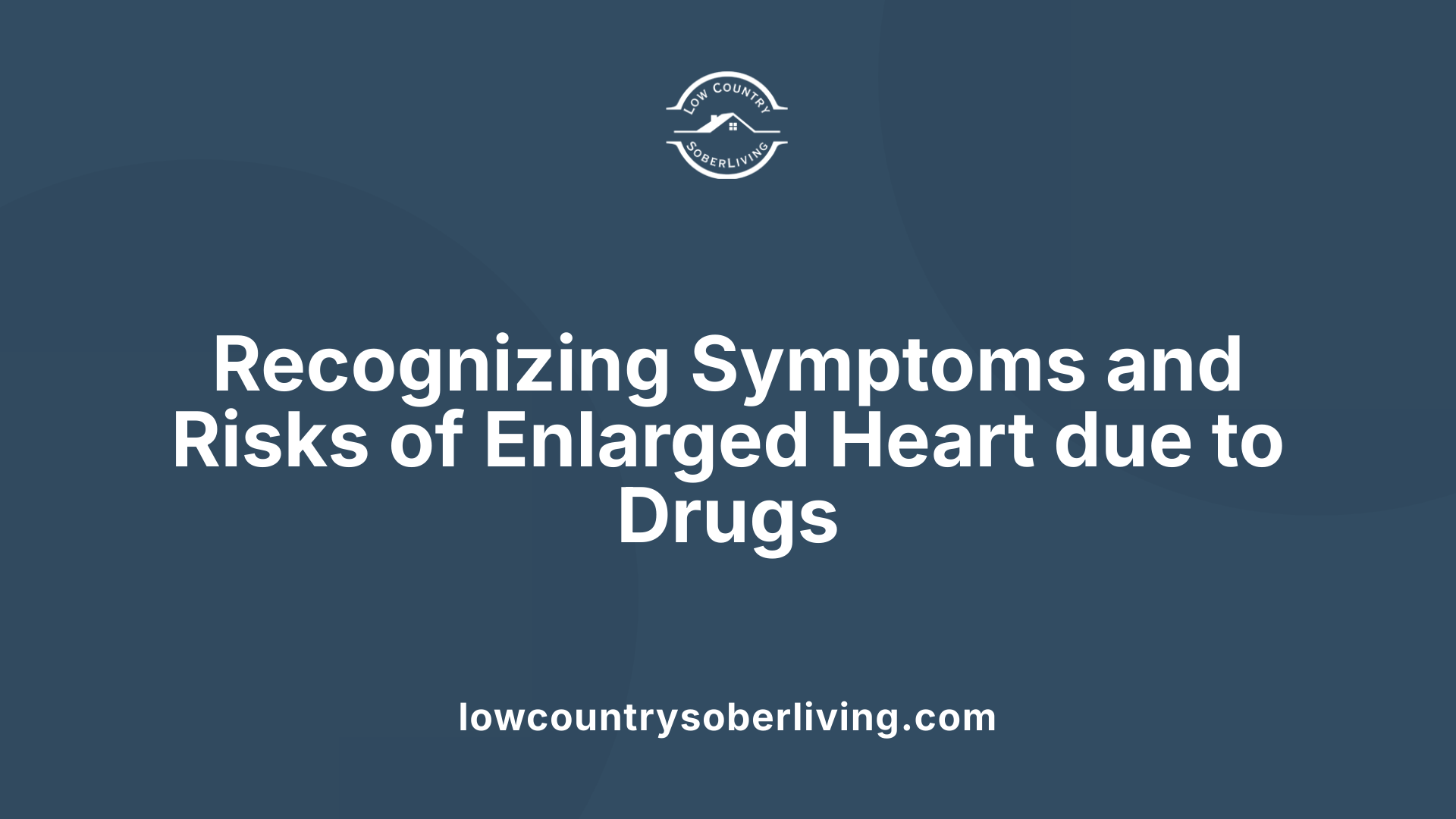 Many substances, especially stimulant drugs like cocaine and amphetamines, can cause the heart to enlarge, a condition known as cardiomegaly. This occurs because these drugs increase blood pressure, constrict blood vessels, and cause thickening of the heart muscle walls.
Many substances, especially stimulant drugs like cocaine and amphetamines, can cause the heart to enlarge, a condition known as cardiomegaly. This occurs because these drugs increase blood pressure, constrict blood vessels, and cause thickening of the heart muscle walls.
Symptoms associated with drug-induced heart enlargement often include chest pain, irregular heartbeat or arrhythmias, shortness of breath, and fatigue. As the heart struggles to pump effectively or becomes overworked, these symptoms can worsen, leading to more severe heart problems.
The health risks linked to damage from such drugs are significant and include heart failure, arrhythmias, and increased chances of myocardial infarction (heart attack). Drugs like cocaine damages cardiac tissue directly and promotes atherosclerosis, which narrows arteries and reduces blood flow. High blood pressure and increased heart workload also contribute to the physical enlargement of the heart.
This combination of damage and stress increases the likelihood of sudden cardiac death and other life-threatening events. Recognizing these symptoms early and avoiding risky substances are vital steps to protect cardiovascular health.
| Symptoms | Health Risks | Underlying Causes | Related Conditions |
|---|---|---|---|
| Chest pain | Heart failure | Increased blood pressure | Cardiomyopathy |
| Arrhythmias | Heart attack | Vasoconstriction | Atherosclerosis |
| Shortness of breath | Stroke | Thickening heart walls | Cardiac tissue damage |
| Fatigue | Sudden cardiac death | Increased workload on the heart | Ventricular hypertrophy |
Substance abuse, especially with illegal stimulants like cocaine and methamphetamines, can significantly damage the cardiovascular system. Avoidance and proper medical consultation are crucial in reducing these risks and maintaining heart health.
Mechanisms by Which Drugs Induce Heart Enlargement
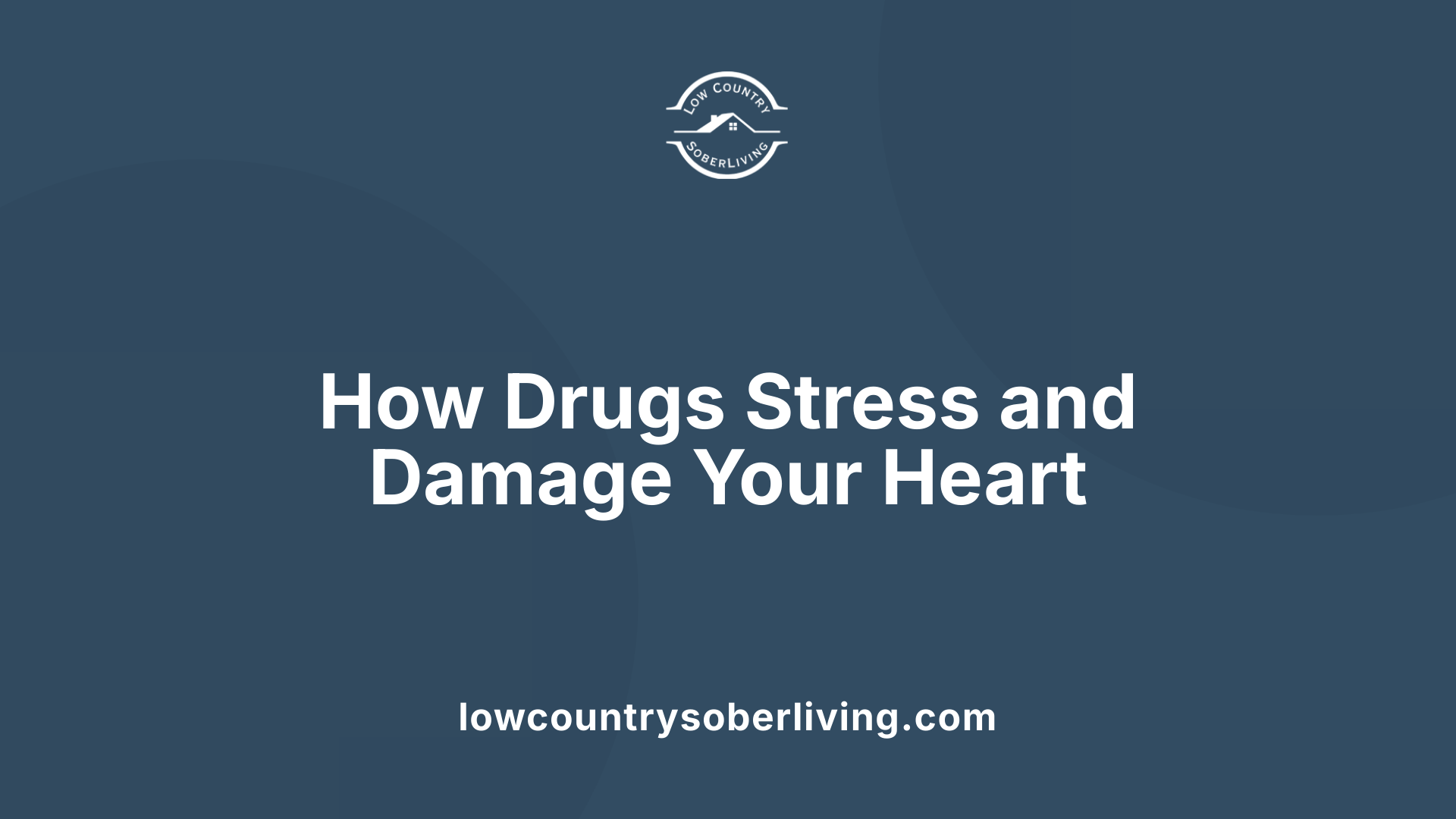
High blood pressure and increased workload
Many stimulant drugs such as cocaine, amphetamines, and methamphetamines cause an increase in blood pressure. This puts extra stress on the heart, especially on the left ventricle, leading to a condition called ventricular hypertrophy—where the heart muscle thickens as a response to the increased workload.
Direct damage to cardiac tissues
Certain drugs can directly harm heart tissues. Cocaine, for instance, can cause damage to the arterial walls, promote blood clots, and lead to heart tissue injury. Long-term use may result in cardiomyopathy, where the heart enlarges due to weakened muscle tissue.
Inflammatory and hypertrophic responses
Infections like infective endocarditis, linked to opioid injection, can inflame and damage the heart lining. Additionally, anabolic steroids cause hormonal imbalances that stimulate abnormal muscle and heart tissue growth. These responses can lead to a physically enlarged heart and increase the risk of arrhythmias and sudden cardiac death.
Understanding how these drugs affect the heart is crucial for preventing long-term cardiovascular complications.
Prevention, Diagnosis, and Treatment Strategies
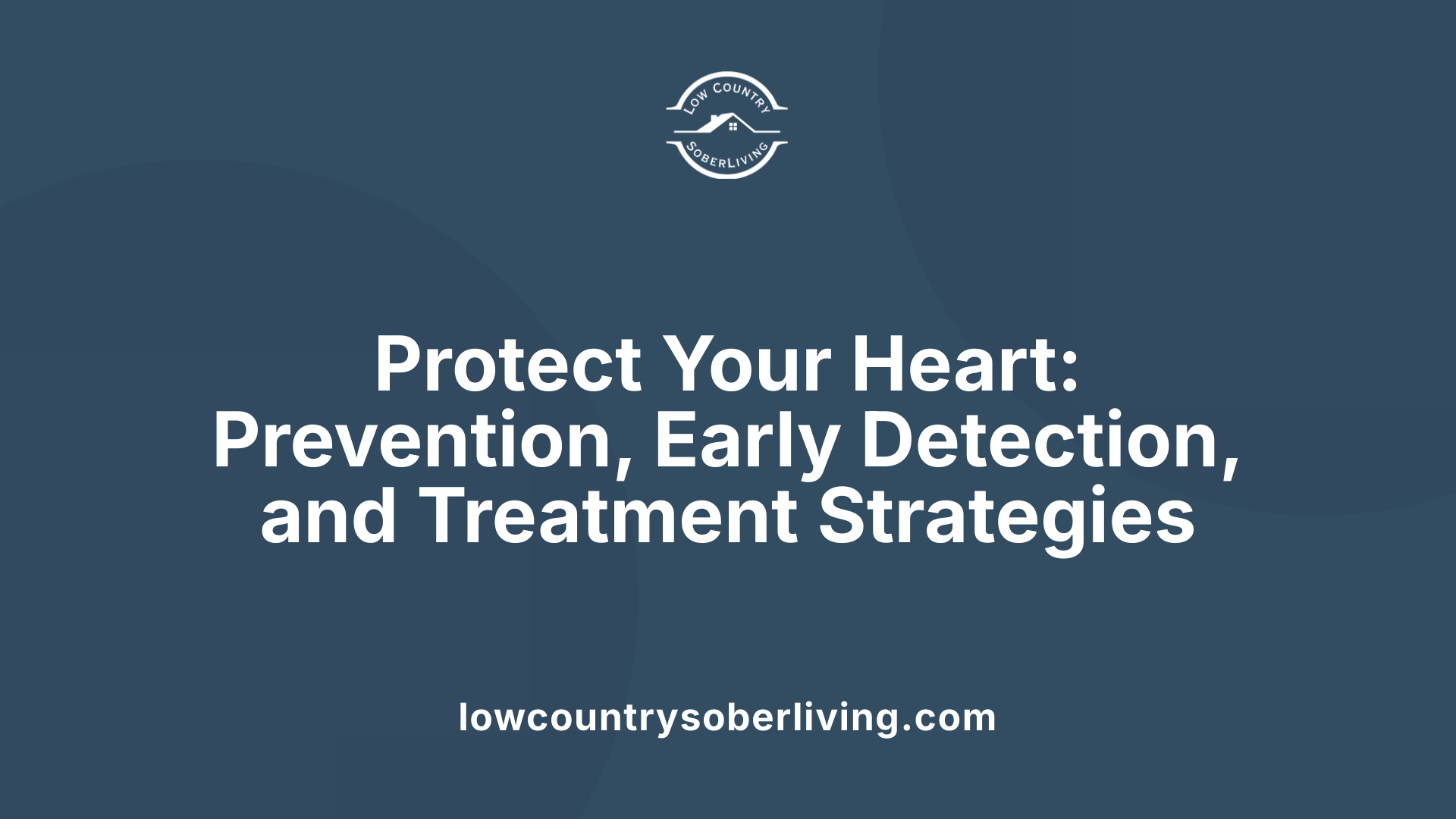
How can lifestyle modifications help prevent drug-induced heart enlargement?
Avoiding illegal drugs like cocaine, heroin, and methamphetamines is crucial in preventing drug-related heart issues. Substance abuse can cause direct damage to the heart muscle, lead to high blood pressure, and result in complications such as cardiomegaly. Maintaining a healthy lifestyle by limiting alcohol consumption and avoiding over-the-counter NSAIDs and vasoconstrictive nasal decongestants can also reduce risks.
Implementing stress management techniques and controlling blood pressure through diet and exercise further lowers the likelihood of heart enlargement. Patients are encouraged to discuss medication use with healthcare providers, especially for conditions like high blood pressure or diabetes, to avoid drugs that might harm the heart.
What medical interventions are available?
When drug-induced heart damage occurs, stopping the offending substance is the first step. Medical treatments may include medications to manage heart failure, such as diuretics, ACE inhibitors, or beta-blockers. In some cases, surgical options or implantable devices like defibrillators may be necessary to correct arrhythmias or support heart function.
For severe damage or cardiomyopathy, procedures like heart transplantation could be considered. Close monitoring through regular cardiac screening helps assess the effectiveness of treatment and guides ongoing care.
Why is regular screening important?
Routine heart evaluations, including EKGs and echocardiograms, help detect early signs of heart enlargement or damage, especially in individuals with a history of substance abuse or those on medications known to affect the heart.
Early detection allows for timely intervention, which can improve outcomes and prevent progression to heart failure. Patients should keep open communication with their healthcare providers about any symptoms like chest pain, dizziness, or irregular heartbeats.
| Strategy | Focus Area | Description |
|---|---|---|
| Lifestyle changes | Preventing drug-related damage | Avoiding risky substances and maintaining a healthy lifestyle |
| Medical treatments | Managing damage | Medications, surgeries, and devices intended to restore heart function |
| Regular screening | Monitoring and early detection | Routine tests to identify early signs of heart enlargement |
Taking proactive steps through lifestyle and medical strategies can significantly reduce the risk of heart enlargement caused by drug use and other contributing factors.
Summary and Key Takeaways
Understanding the link between drugs and heart enlargement
Many recreational and prescription drugs can directly or indirectly cause the heart to enlarge. Stimulant substances like cocaine, amphetamines, ecstasy, and methamphetamine increase heart rate and blood pressure, placing excess stress on the heart muscle. These effects can lead to cardiomyopathy, which is characterized by an enlarged heart that struggles to pump blood efficiently. Cocaine specifically can stiffen arteries, damage cardiac tissue, and cause heart infections, all contributing to heart growth.
Anabolic steroids disrupt hormonal balances, resulting in abnormal muscle growth including the heart’s ventricles. This ventricular hypertrophy raises the risk of dangerous arrhythmias and sudden death. Excessive alcohol intake weakens the heart muscle over time, leading to alcoholic cardiomyopathy, a condition marked by a dilated and ineffective heart.
Infections such as infective endocarditis, especially from injected opioids, can cause structural changes in the heart, impacting its size and function. These drugs also promote conditions like high blood pressure, which further aggravate heart enlargement and damage.
Importance of lifestyle and medical management
Preventing drug-induced heart issues involves avoiding illegal drug use, limiting alcohol intake, and managing pre-existing health conditions like hypertension. Medications for high blood pressure, diabetes, and heart failure need to be carefully managed, as some can worsen heart enlargement if misused.
Lifestyle changes such as maintaining a healthy diet, exercising regularly, and not smoking also play critical roles in protecting heart health. Medical interventions may include stopping causative drugs, prescribed medications, or even surgical procedures for severe cases.
Risks of drug abuse on long-term cardiac health
Long-term abuse of stimulants, alcohol, and corticosteroids significantly increases the risk of developing cardiomegaly. This enlargement impairs the heart’s ability to pump blood efficiently, which can lead to heart failure or arrhythmias. Chronic drug use can also cause thickening of heart walls, increased oxygen demand, and accelerated atherosclerosis—the buildup of arteries—which all contribute to worsening cardiac health.
In summary, awareness of how various substances impact the heart is crucial. Early diagnosis and consistent management can improve quality of life and help prevent severe complications.
| Substance Type | Impact on Heart | Long-term Risks | Additional Notes |
|---|---|---|---|
| Stimulants (cocaine, amphetamines) | Heart enlargement, increased blood pressure | Heart failure, arrhythmias | Cause sympathetic nervous system activation |
| Anabolic steroids | Ventricular hypertrophy | Sudden death, arrhythmias | Disrupt hormonal balance |
| Alcohol | Alcoholic cardiomyopathy | Heart failure, weakened muscle | Long-term excessive intake |
| Opioids | Infective endocarditis | Cardiac infections | Particularly with injection use |
| Recreational drugs | Cardiomyopathy, enlarging heart | Cardiac complications | Includes ecstasy, marijuana |
Understanding these connections underscores the importance of moderation and medical guidance to maintain cardiovascular health.
Maintaining Heart Health in the Face of Substance Risks
Recognizing the impact of various drugs on heart size and function underscores the importance of prevention, early diagnosis, and appropriate management. Abstaining from harmful substances, controlling underlying health conditions like hypertension, and seeking regular medical care can significantly reduce the risk of developing an enlarged heart. Awareness and lifestyle choices remain essential tools in safeguarding long-term cardiovascular health.
References
- Can Drugs Cause an Enlarged Heart? - Conifer Park
- Illegal Drugs and Heart Disease | American Heart Association
- Cardiomegaly (Enlarged Heart): Symptoms & Causes
- Cardiovascular complications of recreational drugs - PubMed Central
- Can Drugs Cause An Enlarged Heart? - Townsend
- Signs of heart damage from drugs - Medical News Today
- 5 Medications That Can Cause Heart Failure - WebMD

